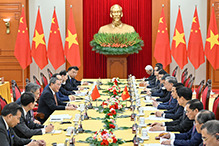Adidas pleased with China's 'intensifying appetite' for sports, fitness


China's growing market for sports and fitness is opening a new vista for global sportswear market leader Adidas, as more and more consumers demand tech-driven and carbon-neutral products, according to its senior official.
"China's influence on the global economy is undeniable, especially in fast-moving areas such as technology and innovation. For this reason, the country is one of Adidas' most important global markets," said Jason Thomas, managing director of Adidas Greater China, on the sidelines of the fourth China International Import Expo that ended earlier this month in Shanghai.
For instance, China has a unique digital ecosystem while consumers here are by far the most digitally savvy in the world, he said.
"The company is tapping into such demand by investing a lot into digital capabilities here in China and have established a dedicated Digital Hub in Shanghai to give us an edge when it comes to e-commerce," he added.
The State Council, China's Cabinet, launched plans earlier this year to push forward a new five-year mass fitness program, under which the sports industry is expected to reach a market value of 5 trillion yuan ($783 billion) by 2025.
Thomas pointed out that the company saw intensifying appetite for sports and fitness from year to year, especially running and women's fitness, as well as outdoor sports, from the Chinese market.
"Adidas eagerly looks forward to continuing to provide our support to these efforts, both through our cutting-edge, performance-enhancing products and technology, as well as building on our long record of nurturing Chinese sports at every level,"he said.
To better suit the appetite of Chinese consumers, Adidas also set up Creation Center Asia in Shanghai, which produces literally thousands of unique, hyper-localized products a year, many of them developed alongside popular local brands and designers.
"Its close proximity to the market allows us to intimately understand and act on local consumer trends and preferences, accelerating new product creation from concept to the moment it hits store shelves in record time," he said.
As China aims to peak carbon emissions by 2030 and attain carbon neutrality by 2060, Thomas said that Adidas already developed an approach to address "our carbon footprint and other areas such as water efficiency."
"On the issue of CO2 emissions specifically, we're committed to reducing our absolute energy consumption and transitioning to clean energy," he said.
During the fourth China International Import Expo that ended in Shanghai, the company showcased its first running shoe with a carbon footprint of less than three kilograms, a shoe made from materials including recycled polyester.




































